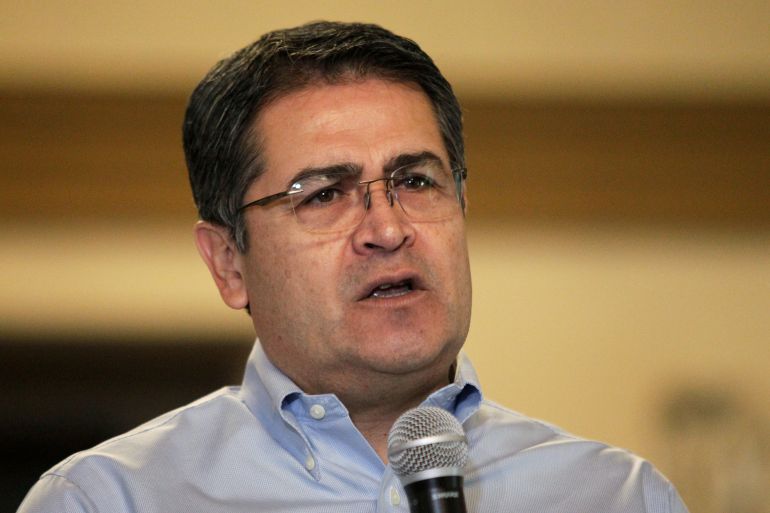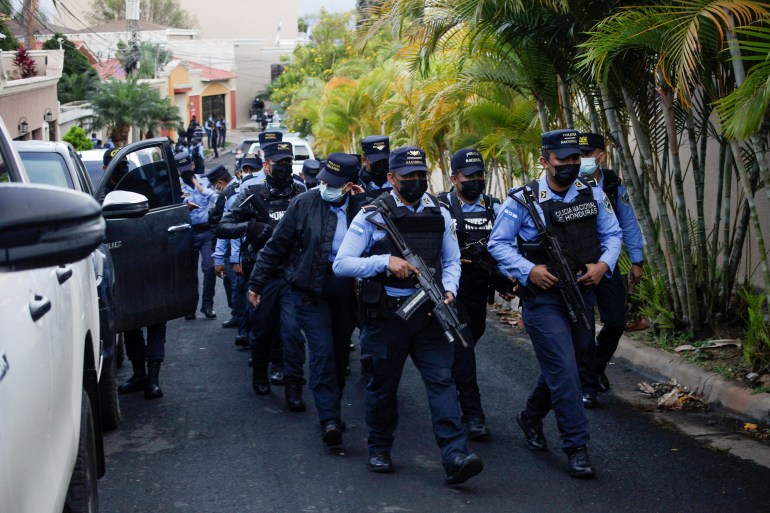Honduras ex-President Hernandez detained as US seeks extradition
The US is seeking to extradite former Honduran President Juan Orlando Hernandez on drug trafficking allegations.

Police in Honduras have detained former President Juan Orlando Hernandez, after a judge ordered his arrest amid an extradition request from the United States on accusations of drug trafficking.
An arrest warrant for Hernandez “has been issued”, court spokesman Melvin Duarte told reporters on Tuesday afternoon, as the ex-president’s home in the Honduran capital, Tegucigalpa, was surrounded by hundreds of police pending a decision on the US bid.
Keep reading
list of 3 itemsHonduras swears in Xiomara Castro as first female president
US requests extradition of former Honduran president
Hernandez must appear before the judge within 24 hours, the spokesman added.
The former president left his home in the Honduran capital, Tegucigalpa, escorted by armed police, television footage showed on Tuesday. He was given a bulletproof vest by police and handcuffed as he exited his residence.
Speculation had been swirling for months that the US was planning to request Hernandez’s extradition when he left office amid accusations that he colluded with drug traffickers. Left-wing leader Xiomara Castro replaced him last month, becoming Honduras’s first female president.
The US is seeking to extradite Hernandez on charges relating to weapons and a drug-trafficking scheme between 2004 and 2022, the Reuters news agency reported on Tuesday, citing a US embassy document.
The embassy said in the document that Hernandez participated in a scheme to receive in Honduras tonnes of cocaine from Colombia and Venezuela, which were then to be shipped to the US.
Hernandez, a former US ally who left office last month, has been linked to drug trafficking operations by New York prosecutors. He has denied the claims, which he said were part of a revenge plot by drug lords that his government had captured or extradited to the US.
Honduras’s Ministry of Foreign Affairs had said via Twitter on Monday that it had notified the country’s Supreme Court that the US embassy had requested the “formal provisional arrest of a Honduran politician” for extradition.
Washington’s extradition request is in contrast to a period when the US government saw Hernandez as a vital ally in volatile Central America during his eight years in power.
Last week, US Secretary of State Antony Blinken said Hernandez was included on a list last year of people accused of corruption or undermining democracy in El Salvador, Guatemala and Honduras.
“The United States is advancing transparency and accountability in Central America by making public visa restrictions against Honduras’ former president, Juan Orlando Hernandez, on account of corrupt actions,” Blinken said on Twitter on February 7. “No one is above the law.”
‘Ready to collaborate’
Earlier on Tuesday, Hernandez said in an audio message on Twitter that his team had already informed the police “that I am ready to collaborate and to come voluntarily … at the time the judge will decide”.
Hernandez said he would do so “to confront this situation and defend myself”.
The US Department of State referred queries to the US Department of Justice, which declined to comment to Reuters. A spokesman for the US Attorney’s Office in Manhattan also declined to comment.
Honduras’s Supreme Court – which will decide on the extradition request – met on Tuesday and appointed a justice to oversee the case. The process could last between two and three months, according to Hernandez’s defence.
Hernandez had been holed up in his home, according to one of his lawyers, after about 100 police officers surrounded it late on Monday.

Dozens of people with banners, meanwhile, celebrated outside Hernandez’s home, while in other cities people took to the streets with loudspeakers singing “Juancho goes to New York” – using a nickname for the ex-president.
Hernandez’s lawyer, Hermes Ramirez, said on Monday that his client enjoyed immunity from prosecution as a member of the Guatemala-based Central American Parliament, Parlacen.
He joined Parlacen hours after leaving office on January 27, when Castro was sworn in with promises to transform the “bankrupt” state he left behind.
Last year, a US judge sentenced Hernandez’s brother to life in prison plus 30 years for drug trafficking and the former president was named as an unindicted co-conspirator in another drug trafficking case in New York.